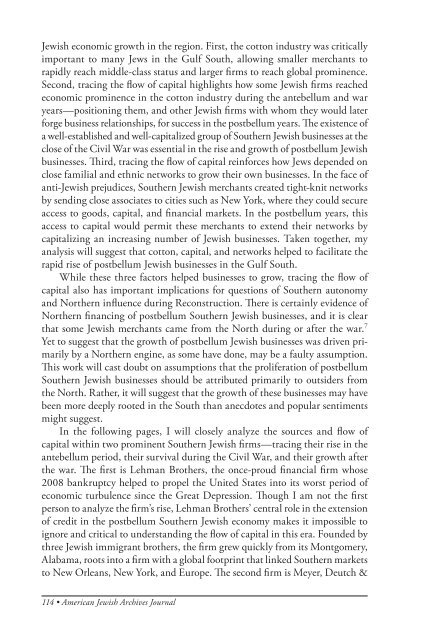American Jewish Archives Journal, Volume 64, Numbers 1 & 2
American Jewish Archives Journal, Volume 64, Numbers 1 & 2
American Jewish Archives Journal, Volume 64, Numbers 1 & 2
Create successful ePaper yourself
Turn your PDF publications into a flip-book with our unique Google optimized e-Paper software.
<strong>Jewish</strong> economic growth in the region. First, the cotton industry was critically<br />
important to many Jews in the Gulf South, allowing smaller merchants to<br />
rapidly reach middle-class status and larger firms to reach global prominence.<br />
Second, tracing the flow of capital highlights how some <strong>Jewish</strong> firms reached<br />
economic prominence in the cotton industry during the antebellum and war<br />
years—positioning them, and other <strong>Jewish</strong> firms with whom they would later<br />
forge business relationships, for success in the postbellum years. The existence of<br />
a well-established and well-capitalized group of Southern <strong>Jewish</strong> businesses at the<br />
close of the Civil War was essential in the rise and growth of postbellum <strong>Jewish</strong><br />
businesses. Third, tracing the flow of capital reinforces how Jews depended on<br />
close familial and ethnic networks to grow their own businesses. In the face of<br />
anti-<strong>Jewish</strong> prejudices, Southern <strong>Jewish</strong> merchants created tight-knit networks<br />
by sending close associates to cities such as New York, where they could secure<br />
access to goods, capital, and financial markets. In the postbellum years, this<br />
access to capital would permit these merchants to extend their networks by<br />
capitalizing an increasing number of <strong>Jewish</strong> businesses. Taken together, my<br />
analysis will suggest that cotton, capital, and networks helped to facilitate the<br />
rapid rise of postbellum <strong>Jewish</strong> businesses in the Gulf South.<br />
While these three factors helped businesses to grow, tracing the flow of<br />
capital also has important implications for questions of Southern autonomy<br />
and Northern influence during Reconstruction. There is certainly evidence of<br />
Northern financing of postbellum Southern <strong>Jewish</strong> businesses, and it is clear<br />
that some <strong>Jewish</strong> merchants came from the North during or after the war. 7<br />
Yet to suggest that the growth of postbellum <strong>Jewish</strong> businesses was driven primarily<br />
by a Northern engine, as some have done, may be a faulty assumption.<br />
This work will cast doubt on assumptions that the proliferation of postbellum<br />
Southern <strong>Jewish</strong> businesses should be attributed primarily to outsiders from<br />
the North. Rather, it will suggest that the growth of these businesses may have<br />
been more deeply rooted in the South than anecdotes and popular sentiments<br />
might suggest.<br />
In the following pages, I will closely analyze the sources and flow of<br />
capital within two prominent Southern <strong>Jewish</strong> firms—tracing their rise in the<br />
antebellum period, their survival during the Civil War, and their growth after<br />
the war. The first is Lehman Brothers, the once-proud financial firm whose<br />
2008 bankruptcy helped to propel the United States into its worst period of<br />
economic turbulence since the Great Depression. Though I am not the first<br />
person to analyze the firm’s rise, Lehman Brothers’ central role in the extension<br />
of credit in the postbellum Southern <strong>Jewish</strong> economy makes it impossible to<br />
ignore and critical to understanding the flow of capital in this era. Founded by<br />
three <strong>Jewish</strong> immigrant brothers, the firm grew quickly from its Montgomery,<br />
Alabama, roots into a firm with a global footprint that linked Southern markets<br />
to New Orleans, New York, and Europe. The second firm is Meyer, Deutch &<br />
114 • <strong>American</strong> <strong>Jewish</strong> <strong>Archives</strong> <strong>Journal</strong>
















